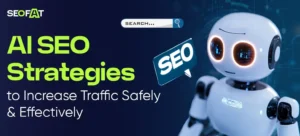In today’s competitive digital landscape, identifying the right keywords is critical for business growth. Traditional keyword research methods are often time-consuming and imprecise, leading to wasted effort and missed opportunities.
By leveraging AI, companies can streamline keyword research, uncover high-value search terms, and align content strategies with actual customer intent. This guide provides a comprehensive overview of how AI-driven keyword research can optimize your marketing efforts and deliver measurable results.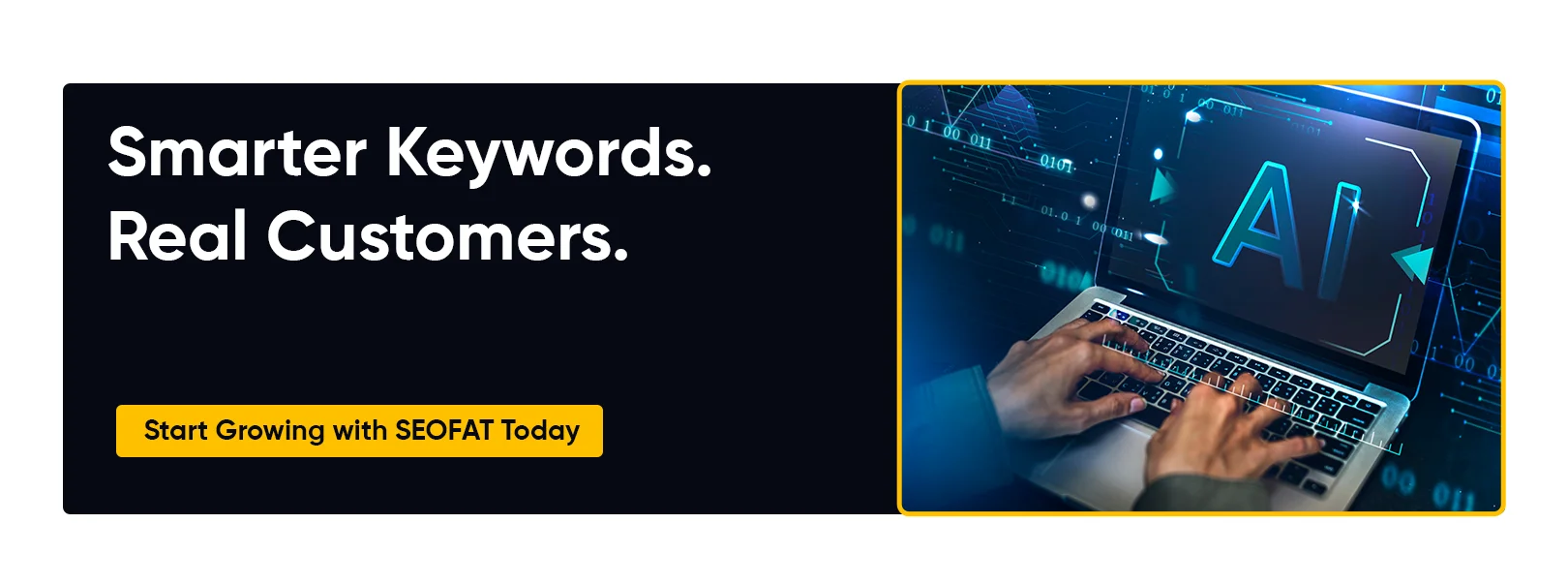
What Sets AI Apart in Keyword Research
AI doesn't create lists, it learns patterns. It observes how people search, what context they provide, and how those terms relate to larger subjects.
Why it feels different from traditional approaches:
- Contextual search intent: AI applications read above and beyond the keyword itself, revealing what users intend to find when they search.
- Speed and scale: Rather than scanning thousands of phrases by hand, AI runs them through in seconds.
- Predictive insights: Certain AI-powered tools can suggest what's coming next based on current events.
- Content alignment: AI aligns keywords to authentic questions, rather than high-volume phrases.
Example: Rather than reporting to a dental clinic that "dentist near me" has 50,000 searches, AI can report that "same-day dental crown near me" receives fewer searches but has much higher intent, and patients are more likely to click through.
Why SMEs Should Care
Keyword research isn't reserved for large corporations.
SEO Automation for SMEs is crucial, as they typically face tougher competition while operating in local or niche markets."
AI benefits SMEs by making keyword research easier.
- Slicing unnecessary time: No more swimming in endless lists.
- Prioritizing buyer intent: Discover words that attract paying customers, not fluke traffic.
- Levelling the field: Match bigger rivals with more clever, not larger, tactics.
- Keeping up to date: AI tools catch up with changing trends, something that is difficult to accomplish manually.
For SMEs, AI isn't about sophisticated technology; it's about achieving useful victories, such as more calls, more form completions, or more local visits.
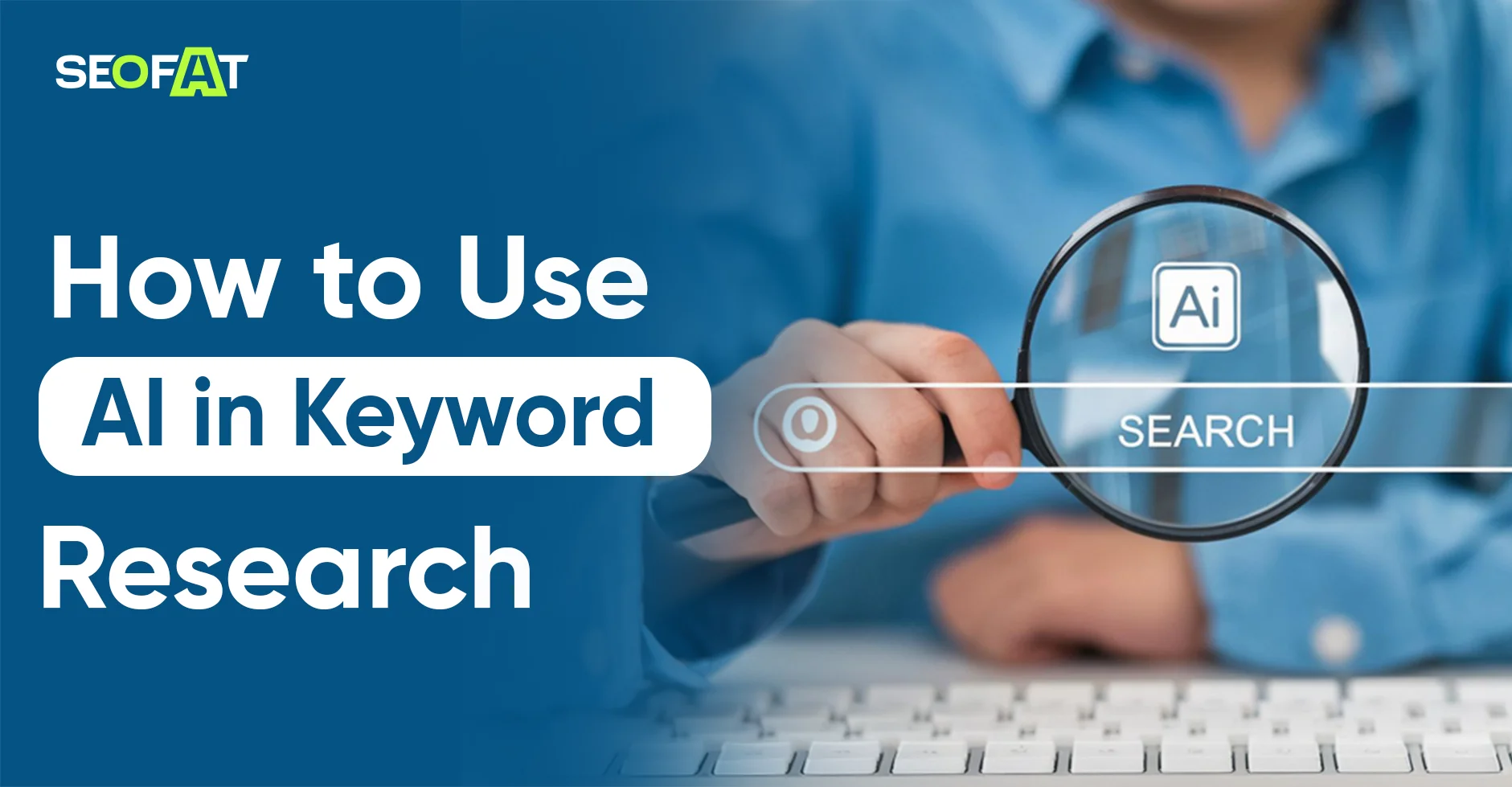 Every tool is not for every business. Some are designed for large corporations, and others are SME-friendly.
Every tool is not for every business. Some are designed for large corporations, and others are SME-friendly.
1. Morningscore
Morningscore gamifies differently. It provides you with SEO scores and progress indicators. This makes keyword monitoring a simple and targeted activity.
- Beginner-friendly: Best for small teams with little/no technical background.
- Progress tracking: Teams receive immediate feedback on engagement with keywords.
Example: A small gym can monitor "cheap personal trainer near me" and receive easy-to-understand progress reports that are easy to communicate with the staff.
2. Serpstat
Serpstat is a cost-effective all-in-one SEO tool. It has keyword research, auditing, and competitor analysis.
- Inexpensive: Less costly than professional-grade software.
- Flexible: Good for SMEs looking to grow step-by-step.
- Competitor Insights: Identifies gaps that competitors are leaving unfilled for customers.
Example: An e-commerce site can see the keywords versus the bigger players. The long-tail phrases, like "eco-friendly water bottles under 500 INR."
3. Mangools (KWFinder + SERPWatcher)
Mangools is designed to be simple. KWFinder shows long-tail keyword potential, and SERPWatcher monitors rankings in a clear-to-read manner.
- Easy to use: Even non-tech personnel can manage it.
- Content-oriented: Ideal for SMEs that are spending money on blogs and content.
- Simple interface: Less daunting than large enterprise solutions.
Example: A specialist bakery writing about "healthy gluten-free desserts" can monitor new keywords without requiring heavy training.
4. SEMrush (Premium Option)
SEMrush is the most recognized name in SEO. Though robust, it's pricier.
- Suite all-in-one: Keyword research, technical SEO, backlinks, content, and advertising.
- Competitive depth: Ideal for aggressively growing SMEs.
- Steep learning curve: Needs some training to utilize optimally.
Use case: An aggressively growing fintech SME may use SEMrush when they're competing nationally and require sophisticated analytics on multiple campaigns.
How to Use AI in Keyword Research
Tools are valuable, but methodology is equally important. Here's how SMEs can implement AI-based research.
1. Begin with Purpose, Not Quantity
Don't target the most competitive keywords. Try for terms that align with what your customer currently needs. AI can bring up long-tail terms with good conversion potential.
2. Create Keyword Clusters
AI assists related words automatically within groups. This benefits content planning, as a single blog article can be optimized for several associated phrases.
3. Follow Real-Time Trends
AI algorithms process data quickly than human efforts. SMEs can capture seasonal trends, such as "tax filing service near me" peaking every April, without exhaustive research.
4. Prioritize Local Terms
AI tools simplify filtering local modifiers such as "near me," city names, or area-based searches.
5. Use AI Suggestions for Content Planning
Don't brainstorm blind; have AI show what questions are being asked, and plan content based on such questions for greater relevance.
Advanced AI Strategies for Smarter Keyword Research
Once you have established the fundamentals, SMEs have the opportunity to expand their reach by pursuing AI-focused solutions that advance keyword research to speedier and more actionable results.
1. Predictive Keyword Insights
There are also artificial intelligence tools available that can analyze large amounts of search history data to forecast whether certain terms are likely to become increasingly in demand. Instead of just responding months down the line, SMEs can create content first, claim those positions as they start to trend, and get their rivals fighting for the low and mid-funnel searches.
For instance, an accounting consultancy would see AI tools light up around an increase in searches for "AI tax filing assistant". If they build the content early, it allows them to capture all of the prospect activity as people become increasingly curious.
2. Voice Search Optimization
With mobile assistants and smart speakers, voice searches are beginning to shape keyword trends. Not only does this highlight a decrease in the use of short strings, but now people are starting to use whole questions like:
- "Where is the nearest 24-hour open pharmacy?"
- "What is the best way to reduce electricity bills in my home?"
AI tools can recognize these conversational queries and suggest natural-sounding long-tail terms SMEs can target.
3. Sentiment-Driven Keyword Choices
Some of the AI platforms can analyze sentiment in addition to keywords. That is, they not only display what people are looking for but also how they feel about it.
Example: A local hotel would be able to observe that individuals looking for "cheap hotels near airport" tend to leave poor reviews. Rather, tracking "affordable family-friendly hotel near airport" provides a better keyword match and matches customer intent.
4. AI-Powered Competitor Gaps
Classic tools merely measure keyword overlap. AI goes further by detecting semantic gaps, areas your competitors don't cover well or at all.
Example: A medical clinic vying with larger hospitals may observe competitors take over "pediatrician near me," but nobody is ranking for "same-day vaccination clinic." That's an opportunity to acquire targeted patients.
AI makes keyword research faster, but it doesn’t replace human insight. Here’s how SMEs can balance both.
- Use AI for the heavy lifting: Let tools generate lists, clusters, and intent analysis.
- Add human context: Local teams know their community. A keyword might be popular online but irrelevant to actual customers.
- Pair with customer feedback: Frontline staff often hear the exact words customers use. Feed these into AI tools for richer insights.
- Polish content tone: AI can propose keywords, but people understand how to word content naturally so that it sounds real.
Frequent Errors to Avoid in AI-Powered Keyword Research
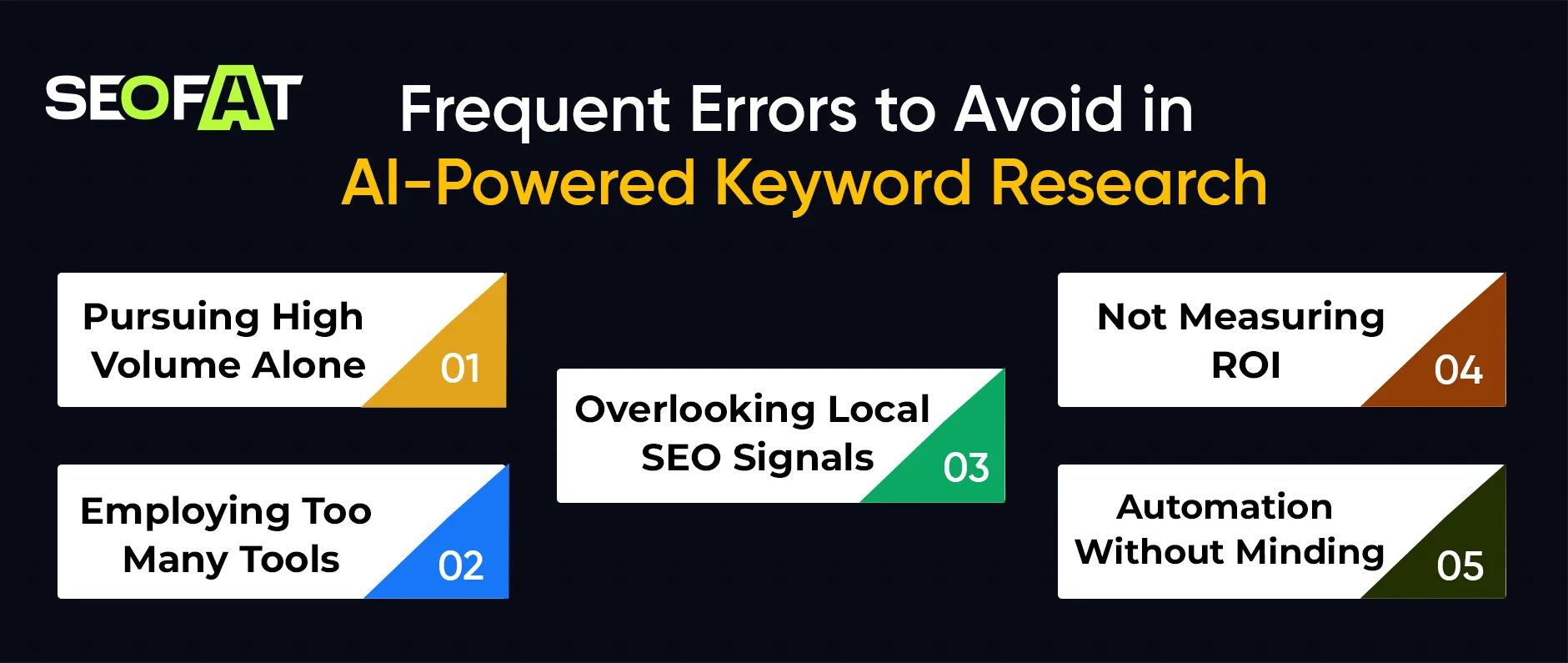 AI isn't perfect. Numerous SMEs fall into the trap of relying overly on the tools.
AI isn't perfect. Numerous SMEs fall into the trap of relying overly on the tools.
1. Pursuing High Volume Alone
A massive search volume keyword may sound appealing, but without intent, it will never convert. SMEs must focus on smaller, intent-based terms rather than vanity keywords.
2. Employing Too Many Tools
More doesn't necessarily equal better. SMEs tend to waste time toggling between dashboards rather than taking action on insights. Begin with a single or double foundational platform that addresses tangible problems.
3. Overlooking Local SEO Signals
AI tools may reveal worldwide trends, yet SMEs typically succeed locally. Ignoring local modifiers such as city names or "near me" statements restricts outcomes.
4. Not Measuring ROI
Keyword rankings are nice in theory, but SMEs must connect them to outcomes, calls, forms, bookings, or sales. Without ROI measurement, SEO is a pointless project.
5. Automation Without Minding
AI tools save time, yet human scrutiny is necessary. Unthinkingly taking advice can create irrelevant content or wasted resources.
Industry-Specific Applications of AI Keyword Research
Various industries use AI-driven keyword research in a way suitable for their audience.
Healthcare
- Compliance-friendly AI tools help clinics and hospitals to protect confidential content.
- Target terms such as "online doctor consultation" or "urgent care near me."
- AI can detect sensitive words that must be handled with caution.
Retail
- Online stores can monitor seasonal keywords.
- AI anticipates highs for terms such as "Diwali gifts under 1000 INR."
- Assists in planning promotions.
Hospitality
- Hotels and restaurants can concentrate on local intent.
- Voice search queries such as "family-friendly restaurant open now."
- AI recommends context-rich terms reflecting travel patterns.
Professional Services
- Accountants, lawyers, and consultants identify long-tail service-related search queries.
- Phrases such as "small business GST filing assistance" or "startup trademark attorney" bring qualified prospects.
Future of Keyword Research with AI
Keyword research is evolving from individual words to complete topics. AI will further fuel this revolution.
- Topic-first approaches: AI organizes keywords as themes, not individual terms.
- Hyper-local targeting: Search engines favor businesses serving communities directly.
- Multimodal search: As Google drives visual and voice inputs, AI tools will prompt keywords associated with images, videos, and voice queries.
- Quicker adaptation: AI programs learn alongside changing search behavior, eliminating the time gap between emerging trends and actionable information.
- The takeaway: SMEs that adopt AI today are planning for tomorrow's search.
FAQs on AI for Keyword Research
Q1. Is AI keyword research only for big companies?
No. Most AI tools are designed for SMEs with low-cost pricing. They offer easy-to-use dashboards.
Q2. Do AI tools substitute human SEO professionals?
By no means. They save time on processing data but require human judgment for strategy and content quality.
Q3. How do AI tools address local SEO?
Good platforms emphasize city, region, and "near me" keywords. This enables SMEs to reach the very people in their service areas.
Q4. Are AI-based keywords always correct?
They're data-driven, but accuracy is enhanced with human verifications. Always check suggestions against actual customer interactions.
Q5. What's the best way for SMEs to begin?
Begin small. Use one AI-based tool to concentrate on 2–3 top priorities: traffic, leads, and local visibility. Grow once the fundamentals are in place.
Conclusion
Keyword research doesn't have to be difficult anymore. The best advice? Partner with SEOFAT to take the guesswork out of keyword research by harnessing AI. Instead of spending hours on spreadsheets or chasing keywords that don’t convert, companies can quickly identify high-value search terms that attract the right audience. This means smarter content strategies, better visibility, and more meaningful results, all without wasting time or resources.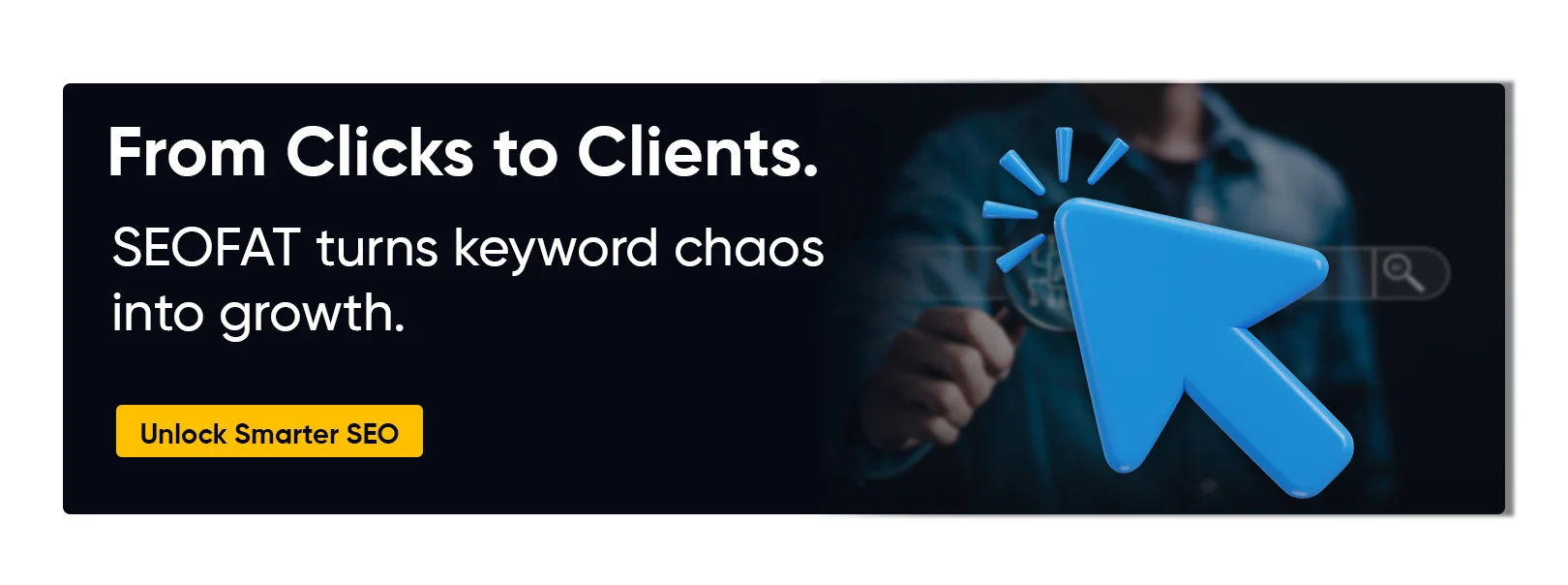


 Every tool is not for every business. Some are designed for large corporations, and others are SME-friendly.
Every tool is not for every business. Some are designed for large corporations, and others are SME-friendly.
 AI isn't perfect. Numerous SMEs fall into the trap of relying overly on the tools.
AI isn't perfect. Numerous SMEs fall into the trap of relying overly on the tools.




